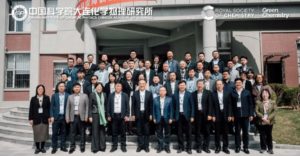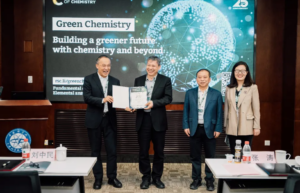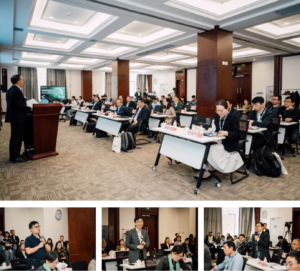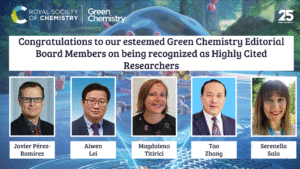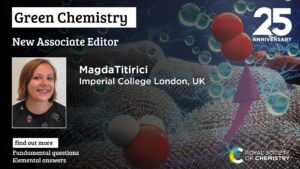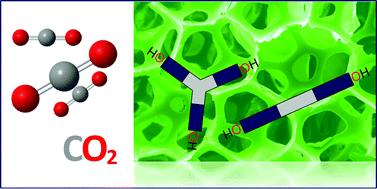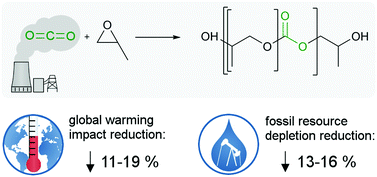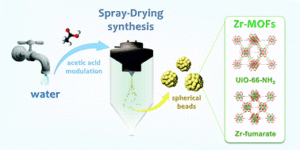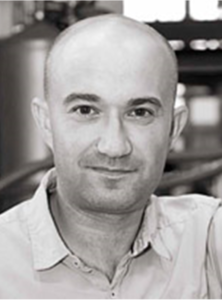
Green Chemistry is delighted to announce a call for papers for its latest themed collection on Exploring the Frontiers: Unveiling New Horizons in Carbon Efficient Biomass Utilization themed collection of Green Chemistry, Guest Edited by Zhi-Hua Liu (Tianjin University), Bing-Zhi Li (Tianjin University), Joshua Yuan (Washington University in St. Louis), James Clark (University of York), Vânia Zuin Zeidler (Leuphana Universitat Luneburg), Lieve Laurens (National Renewable Energy Laboratory), Arthur Ragauskas (The University of Tennessee Knoxville), Joao Coutinho (CICECO-Universidade de Aveiro) and Buxing Han (Institute of Chemistry, Chinese Academy of Sciences). Open for submissions until October 31, 2024.
Lignocellulosic biomass, which is the most plentiful source of renewable energy, serves as a vital storehouse of energy within chemical bonds formed during photosynthetic CO2 reduction. The utilization of this abundant natural resource has a transformative role in the advancement of sustainable development and human civilization. Biomass conversion employs environmentally friendly techniques to convert renewable bioresources into valuable products such as biofuels, chemicals, and materials. Biomass utilization contributes significantly to the transition towards bio-economy, green chemistry, and carbon neutrality.
About this Themed Collection
This themed collection intends to showcase cutting-edge research, advancements, and innovations in carbon efficient biomass utilization, with a particular focus on uncovering new possibilities and opportunities in this field. It also aims to showcase innovative biotechnical solutions that can effectively transform biomass for a wide range of applications, while also addressing the current challenges and prospects in the field of carbon efficient biomass utilization. We believe that this themed collection will be of great interest to researchers in various fields such as green chemistry, synthetic biology, artificial intelligence, enzyme engineering, lignin valorization, biorefineries, sustainability, and environmental studies, among others.
Preferred topics include but are not limited to:
- Biomass fractionation technologies: Exploration of emerging deconstruction and fractionation approaches to enhance the accessibility and convertibility of the biomass.
- Enzymatic and microbial conversion: Prospecting novel enzymes and microorganisms for efficient bioconversion of carbohydrates and lignin into value-added biofuels, biochemicals, and biomaterials.
- Synthetic biology approaches: Highlighting the application of synthetic biology principles to design microbial cell factory for improved biomass conversion; designing biosensors to regulate metabolic networks and enhance microbial cell factory performance.
- Biocatalysis and enzyme engineering: Showcasing advancements in biocatalysis and enzyme engineering to enhance their efficiency, specificity, and stability in carbohydrates and lignin conversion.
- Artificial intelligence (AI) technology: Exploiting cutting-edge AI and machine learning techniques for screening, mining, engineering, and de novo design of vital ligninolytic enzymes and other important enzymes in biomass and lignin valorization.
- Design and evaluation of sustainable and carbon efficient biomass utilization: Exploring innovative approaches and routes to enhance the sustainability and carbon efficiency of biomass and lignin valorization; developing a synthesis solution for producing biodegradable and sustainable materials from biomass utilization; promoting a circular carbon economy and striving towards carbon neutrality in biomass utilization.
- Other innovative technical strategies for carbon efficient biomass utilization.
This call for papers is open for the following article types:
- Communications
- Full papers
- Reviews
How to Submit
If you would like to contribute to this themed collection, you can submit your article directly through the journal’s online submission service at https://mc.manuscriptcentral.com/gc before the deadline (October 31, 2024). Please answer the themed collection question in the submission form when uploading your files to say that this is a contribution to the themed collection and add a “Note to the Editor” that this is from the Open Call.
About the Journal
Green Chemistry provides a unique forum for the publication of innovative research on the development of alternative green and sustainable technologies. The journal publishes original and significant cutting-edge research that is likely to be of wide general appeal. Recently we have produced a YouTube video explaining the green advance requirement for Green Chemistry, which can be found here (alternative link here). A more detailed video summarising some of the benchmarking metrics to satisfy this requirement can be found here (alternative link here). We hope these are helpful to you during the writing process. For more information on the journal, please visit the journal homepage and see this editorial.
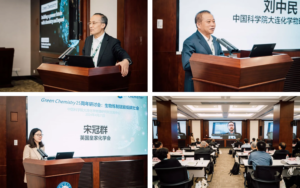 The opening ceremony was hosted by Prof. Tao Zhang (Director of the State Key Laboratory of Catalysis Fundamentals of the Dalian Institute of Chemical Physics and Green Chemistry’s Editorial Board Member), Prof. Zhongmin Liu (Director of the Dalian Institute of Chemical Physics), and Dr Guanqun Song (Regional Publisher at the Royal Society of Chemistry). Dr. Michael Rowan (Green Chemistry’s Executive Editor) also extended his welcoming to this event via video, and thanked the Dalian Institute of Chemical Physics for its support and contribution to this symposium. After the opening ceremony, Prof. Tao Zhang awarded the Green Chemistry Excellence certificate to the speakers.
The opening ceremony was hosted by Prof. Tao Zhang (Director of the State Key Laboratory of Catalysis Fundamentals of the Dalian Institute of Chemical Physics and Green Chemistry’s Editorial Board Member), Prof. Zhongmin Liu (Director of the Dalian Institute of Chemical Physics), and Dr Guanqun Song (Regional Publisher at the Royal Society of Chemistry). Dr. Michael Rowan (Green Chemistry’s Executive Editor) also extended his welcoming to this event via video, and thanked the Dalian Institute of Chemical Physics for its support and contribution to this symposium. After the opening ceremony, Prof. Tao Zhang awarded the Green Chemistry Excellence certificate to the speakers.

